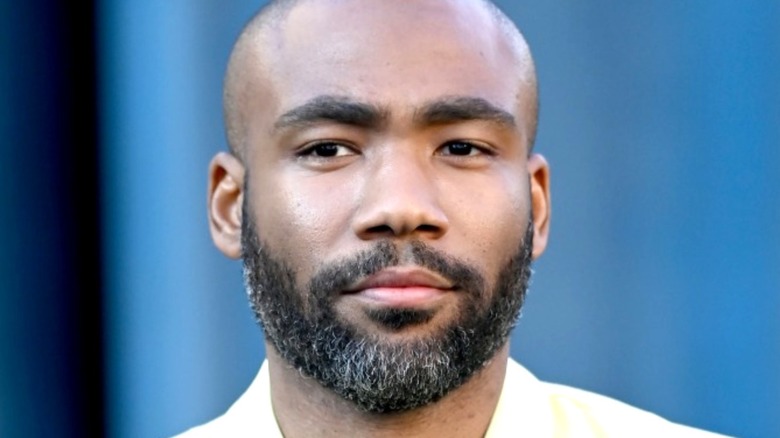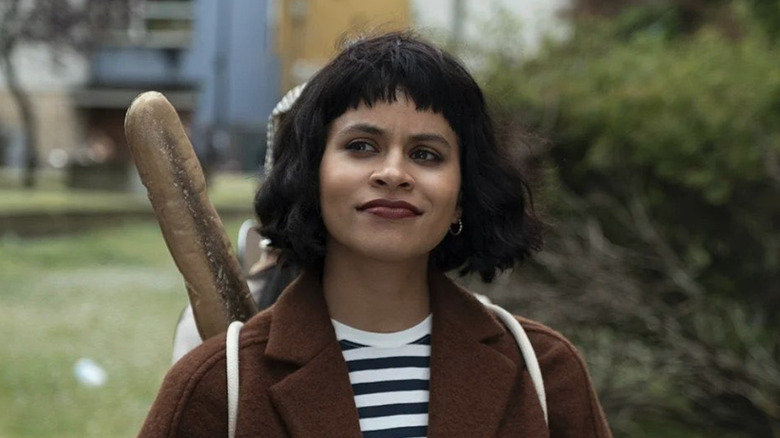The Ending Of Atlanta Season 3 Explained
Contains spoilers for "Atlanta" Season 3 finale, "Tarrare"
Every season of "Atlanta" is a wild ride, but the Eurotrip-themed Season 3 mops the floor with what came before. The season brings the action to some pretty wild places, from lavish houses hidden behind run-down apartments to disturbing dreams and famous European cities. The episodes seem to have no problems shifting their focus whenever — and wherever — the mood strikes, which ends up giving some characters surprisingly little attention.
For much of the season, Van Keefer (Zazie Beetz) seems to be the prime victim of this approach, as she receives very little attention in the first nine episodes. Over the season, she turns up in quick mid-credits scenes, chance encounters, and small, ominous hints that everything's not all that well. Fittingly, then, the season finale is all about Van, though as her previous appearances have teased, this isn't quite the Van you're familiar with. But what, exactly, has she been up to in Europe, and how does it factor in the ending of "Atlanta" Season 3? Let's take a look!
The following article contains mentions of substance abuse, violence, and cannibalism.
The episode is a twisted take on a French classic
It turns out that Van has been on a journey of self-reinvention, inspided by the French movie "Amélie," one of the highest-grossing foreign-language films in the U.S. Bits and pieces of the Jean-Pierre Jeunet classic's signature look and tone are present throughout, from Van's very Amélie Poulain-style clothes and bob hairdo wig — which just might be the one she was accused of stealing in "White Fashion" — to her casual interference with the people around her. As writer Stefani Robinson told The A.V. Club, this was very much the intention. However, this being "Atlanta," Van's actions have a distinctly different vibe from the episode's inspiration.
From absurd encounters with gangs and melee weapon baguettes to outright cannibalism, it's clear that Van's not living in a romantic comedy. Instead, her various missions involve all sorts of disturbing and violent behavior, as befits her nickname within the episode, Tarrare. This is a not-so-subtle reference to a real historical entertainer known as Tarrare, the man who couldn't stop eating. The historical Tarrare was always ravenously hungry and capable of eating virtually anything, reportedly up to and including a human being. Van herself refers to that last part in the episode, and indeed, she appears to be delivering ingredients for a very ... human-themed dinner, which a few characters later enjoy with cloth covering their heads, a manner reminiscent of the real-life practice of eating ortolan.
In the end, Candice (Adriyan Rae) manages to help Van drop her French-themed coping mechanism, which turns out to have a surprisingly tragic side. However, with "Atlanta" Season 4 reportedly continuing the Europe theme, it remains to be seen how her time in France impacts her, or where her future lies.
Alexander Skarsgård has a blast as a parody of himself
Celebrity cameos aren't exactly unheard of in "Atlanta." Season 3 alone treats viewers to a wildly self-decrepitating Liam Neeson appearance, which alone should fill the celeb quotient of any lesser show.
Leave it to "Atlanta," then, to do one better in the season finale, where Van has struck up a somewhat surreal and ruthless friendship with actor Alexander Skarsgård, who appears as an unhinged parody version of himself who seems to enjoy life in ways that significantly differ from the mainstream, and has a thing for humiliation. Van nigh-casually destroys Skarsgård's career with a framed drug addiction scenario, and further humiliates the actor when he confronts her about this.
In an interview with The A.V. Club, "Atlanta" writer Stefani Robinson revealed that the original candidate for this wild cameo role was actually Ryan Gosling. However, Skarsgård certainly made the part his, and threw himself into it like a true professional. Oh, and that wild leopard print underwear during his dance scene? Robinson seemed to remember that it was not only Skarsgård's own idea, but the very condition the actor had for doing the scene in the first place.
If you or anyone you know is struggling with addiction issues, help is available. Visit the Substance Abuse and Mental Health Services Administration website or contact SAMHSA's National Helpline at 1-800-662-HELP (4357).
The post-credits cliffhanger teases strange things for Earn
Earn (Donald Glover) is almost completely absent from the ending of "Atlanta" Season 3, much like Van is mostly unseen in the other episodes. However, in a way that mirrors Van's mid-credits appearance in the otherwise Van-less "The Old Man and the Tree," Earn finally turns up for some post-credits action in the final moments of the season. Here, he unpacks a bag that contains a bunch of things that are clearly not his, such as a Deftones album and a portrait of a family that seems to belong to another man called either White, Earn, or both (Tobias Segal).
This mystery "White Earn" appears in two previous episodes to deliver philosophical lectures before things get a truly unnerving turn. He's also supposed to be dead after the events of "The Big Payback," so the sudden emergence of his baggage at Earn's hands is dripping with symbolism and impeding gloom. Is Earn destined to take his namesake's place in some way? Has he already done so? Or does "Atlanta" Season 3 just deliberately stir the pot by having Segal's mysterious character open and close the season? Fans will have to wait until Season 4 to get some definite answers ... or, as the case may well be, an additional pile of intriguing, symbolism-laced questions.



